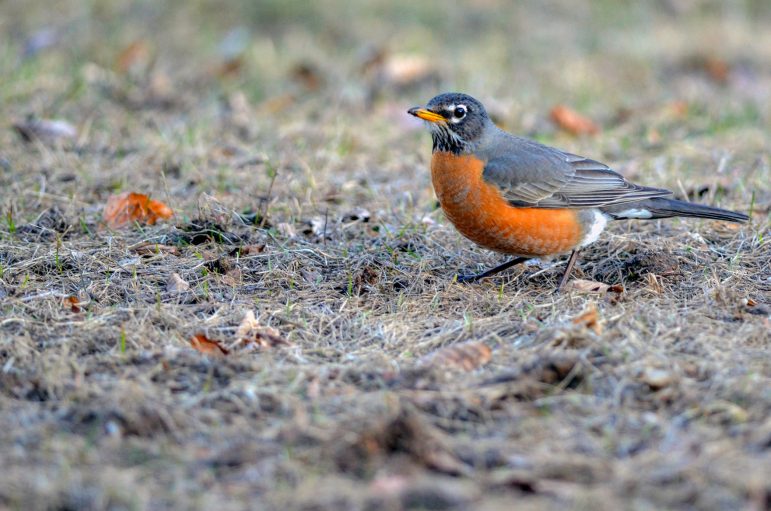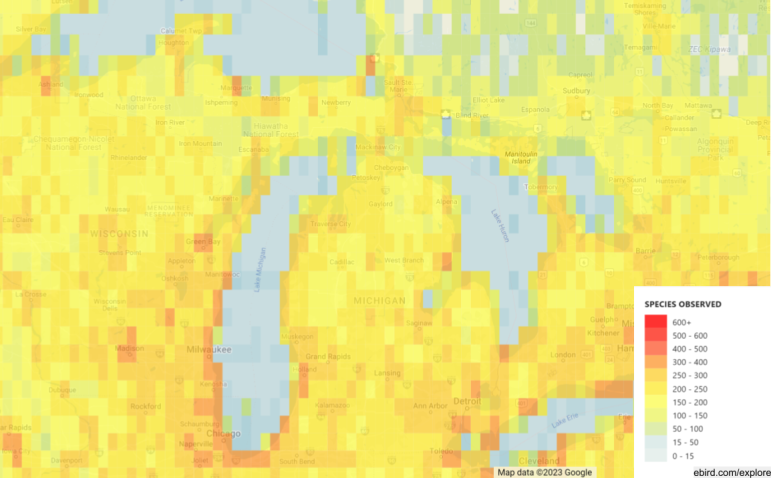
The American robin, Michigan’s state bird, could be part of a legion of mental health therapists. It has been logged over 19 million times on the birdwatching app eBird. Image: Michigan Department of Natural Resources
By Daniel Schoenherr
The Great Lakes region’s more than 300 bird species may provide valuable mental health benefits.
A recent study from Carleton University in Ontario shows there are fewer mental health-related hospitalizations in Michigan areas with high bird diversity.
Previous studies have linked the presence of foliage to mental health, but the author of this study, Rachel Buxton, said this is not the only element of nature that could impact mental health.
“Birds need trees…so we thought maybe it was just green space that is driving this relationship,” said Buxton, who is an assistant professor of biology at Carleton. “And that wasn’t the case, which is interesting.”
“This is a first (broad) look at the relationship of very severe mental health outcomes…and biodiversity,” Buxton said.
Her study is one of many made possible by a popular bird watching app: eBird. The app allows users to log an area’s birds, earning badges for recording sightings of different species.
Buxton’s study used eBird’s data to cross-reference the number of bird species in each Michigan zip-code with the number of reported mental health-related hospitalizations in the same year.

This chart shows bird diversity hotspots across Michigan. Areas on the coast of large bodies of water tend to have the highest number of species. Data from eBird.
Zip codes for coastal regions like Holland and Tawas City tend to have a higher number of species reported, while inland regions like Grand Rapids and Roscommon have smaller numbers.
The relationship between biodiversity and mental health is often reported in textbooks, Buxton said. “It’s coming up again and again.”
The connection is likely linked to sound and human evolution, Buxton said. “Humans are tuned to signals of safety and danger.”
An environment full of different species indicates that there is food, water and shelter nearby — things that both people and animals need to survive.
Fewer species in an area could mean that something is wrong. That could mean environmental needs cannot be met or danger is nearby, Buxton said.
Environments where everything has “gone quiet” could indicate danger and induce stress, Buxton said. “That has very negative downstream health repercussions.”
“Humans rely on sound, it’s the first sense we get as human beings in the womb,” she said.
There is tons of evidence that listening to nature — even on headphones — can have health benefits, she said.
Jenna Curtis, eBird project leader at the Cornell Lab of Ornithology, said thousands of projects across the world use the data.
The app records information, including recent locations of flamingoes in Wisconsin. A team of eBird developers review and confirm the data submitted by users, Curtis said.
The app provides data for uses as diverse as high school science projects, training computer programs and fueling new legislation for protecting endangered birds, Curtis said.
Buxton said before eBird, researchers like her had very little data about birds to go off of.
“We used to have nothing, no information,” Buxton said. “(eBird) is opening up a world to scientists.”
Buxton said she wants to explore the connection between birds and mental health on a smaller scale.
“Nature is preserving our health,” Buxton said. We need to be looking at it as a reciprocal relationship…. How do we make sure we’re doing our part to preserve nature?”
You can find the eBird app at Apple’s App Store and Google Play.